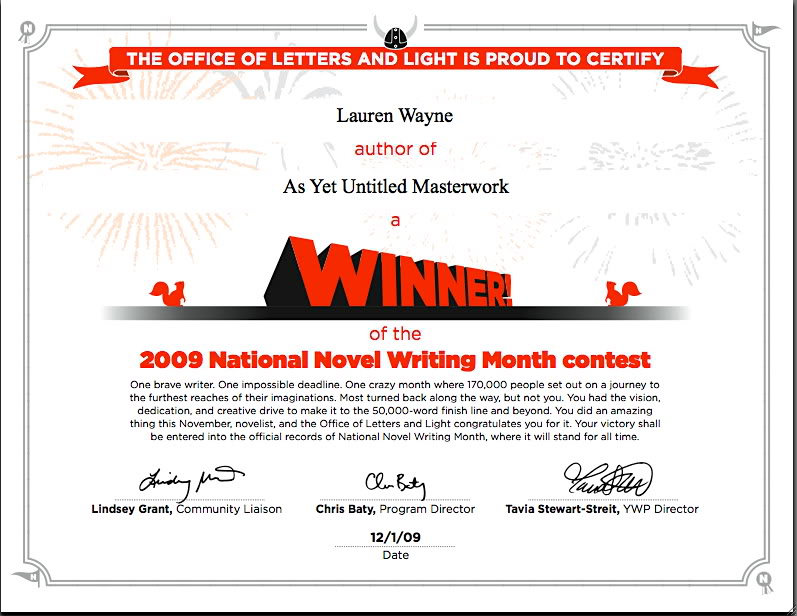Showing posts with label novels. Show all posts
Showing posts with label novels. Show all posts
2.24.2016
Lean into your writing challenges
Sometimes when you're writing fiction, you'll get to a place where a character does something unexpected, and you'll want to fix it.
Or you'll realize your plot would be stronger if some terrible thing befell your protagonist, but you have a protective urge pulling you back.
Or you'll introduce a detail that messes with the tidy outline you had in your mind, and you try to figure out a painless way to erase it.
Don't. Move forward. Push through the hard way, never minding the thorns. Laugh about how much harder and messier you're making it for yourself.
Nine times out of ten, your novel will be better for it.
1.18.2016
Creating character & setting sheets for your novel
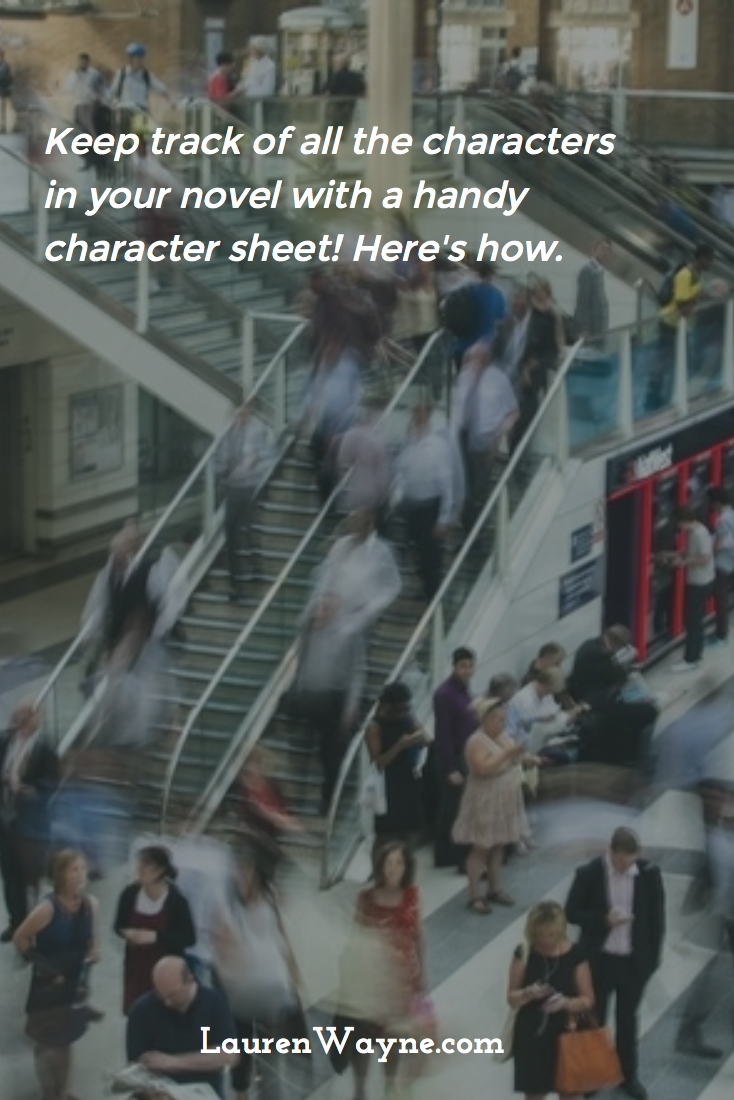
I mentioned in my post on winning NaNoWriMo this past year that one thing I noticed in writing the second book in my mystery series is how hard it is for me to keep track of minor characters' names and settings. I realized I needed a system in place to handle all these details.
Why make character sheets?
You're chugging along on your work in progress when suddenly your mind blanks. Were your protagonist's mom's eyes blue or brown? Rack your brain no more! Simply consult your handy-dandy character sheets, scroll to the appropriate box, and there it is in print: Oh, right! They were hazel!If you're writing a series, it's even more imperative to keep track of these pesky details from one book to the next. Remember how long your characters have lived in a certain place, or what jobs they had in the past. Note down when they first met a new friend.
You can make the same type of notations for settings and other details in your stories. Then you'll know where their favorite diner is located, what its name is, and who the surly server is they love to hassle.
The other benefit of having character sheets (also known as character profiles, character questionnaires, character charts, etc.) is that it inspires you to include more description. If you're like me and description is locked into your head but rarely makes its lethargic way onto the paper, having character sheets staring you in the face with slots for eye color and height and so forth makes you want to make decisions about those things and figure out interesting ways to include them. Clever descriptions will bring your novel alive, so it's a boon to have an avenue for mindfully considering what to add to your writing.
So, now that I've convinced you you need them…
How do you make character sheets?
Some writing software, such as Scrivener (a Mac program I used for one NaNo), has built-in capabilities for crafting character sheets. I wanted something more mobile, though, because I often work on my novels (and blogging) when I'm out and about. Most comprehensive writing software (including Scrivener) doesn't have a mobile component that works on my (Android) phone.Enter: Google Drive. Bam.
I already am writing my current novel in Google Docs, and I transferred my earlier writing there as well. (FYI, I blog on the go using Chrome and the horrifying Blogger app, but I don't recommend either for publishing, just for drafting. They both truly suck for the job, and I will take any suggestions for improvement over them.)
For my character sheets, I also considered Evernote, since it's also readily available on both mobile and computers, but I have problems with the Evernote app being finicky, and I understand and like the functionality of Google Drive. Plus, I realized I could best organize the data in — nerd alert! — a spreadsheet!
Google Sheets to the rescue!
 |
| Hope you can kind of see that. You can click on it to embiggen a bit. |
Labels:
google,
mystery novels,
novel writing,
novels,
tutorials,
writing,
writing tutorials
1.15.2016
On winning NaNoWriMo 2015

First of all: Woot!
I hadn't been planning to do National Novel Writing Month this past year, but Tree of Write On, Mom! asked if I was going to, and so I did.
I am very suggestible.
The idea popped into my head that I could use the opportunity to do something I'd been meaning to, which was write the second book in my mystery series. And so I did! And now I feel so much better!
It's still a crappy first draft, because I'm working on finishing up editing the first one right now instead of fixing the second, but it's nice to have the story written and sitting there ready to edit. I'm quite pleased with how it turned out.
It makes me think I should write a novel every other month or so. Maybe every three months, with two off to edit? (This isn't going to happen, but apparently it could!)
Labels:
cozies,
mystery novels,
NaNoWriMo,
NaNoWriMo winner,
NaNoWriMo15,
novel writing,
novels,
winner,
writing
3.23.2014
Sunday Surf: Pinterest, moms writing, & book signing pressure
 Links to share, from Writing Tidbits:
Links to share, from Writing Tidbits:Validating for Rich Pins for Pinterest: Blogger Xpertise
Make your pins stand out.
Pinterest recently announced new functionality for “Rich Pins” for Pinterest for different types of pins (product, recipe, movie, or article).
| Pinterest + iPad = Love (Photo credit: Bunches and Bits {Karina}) |
2.18.2014
Olympic, side-splitting cozy: Murder on Ice, by Alina Adams
 Want some novel reading to go along with your Olympics watching? As the women's figure skating finals come into view, read up on the world behind the scenes in Alina Adams' hilarious and entertaining mystery, Murder on Ice.
Want some novel reading to go along with your Olympics watching? As the women's figure skating finals come into view, read up on the world behind the scenes in Alina Adams' hilarious and entertaining mystery, Murder on Ice.Granted, Murder on Ice is set at the world championships, but close enough. For those of us who follow figure skating once every four years, this is all a fun new experience.
Full disclosure up front: I happened to tell Alina Adams on Twitter (I think? It was awhile ago — I am anything but prompt!) that I loved her book (the paperback version) and was going to review it on my blog, and she offered to send me the multimedia Kindle version as well. So this isn't a sponsored post, but I did get a free enhanced e-book out of it!
So, this all makes me want to review Murder on Ice first as a reader — and then as a writer. It's an inspiring book in both categories!
Reader's review
Bex Levy is a researcher for the TV series 24/7, and she's in charge of knowing everything — absolutely everything — about the figure skating competition that the famous commentators might need for their patter and that the show might need for choosing camera angles and interview opportunities.I came across the term micro-niche, and I love it. As a reader, it means you can find something written specifically to your interests: In this case, you can enjoy a peek into the world of figure skating and the world of being a professional TV researcher, as well as enjoy a cozy mystery along the way. I suppose some readers choose interests that already align with what they know; I actually love opportunities like this, where I get to see into a life I've never led.
It's not enough just to have an intriguing setting, though — fortunately, the book comes through with a clever mystery and plenty of funny. An Italian judge is murdered — and Bex's boss decides that, as a researcher, Bex is the perfect person to find the killer in time to reveal on air at the finale! But no pressure.
Bex, underpaid and generally beleaguered, sees no choice but to agree. She does already know all the players and quickly becomes adept at nosily sussing out their secrets.
One of my favorite passages is when Bex considers the lengthy and detailed descriptive travel passages in mystery fiction. I've often wondered about the same thing.
"As a reader, Bex had assumed the technique was nothing more than filler. […] However, now that she was a sleuth herself, Bex decided to give all those poor, maligned writers the benefit of the doubt and guess that the interminable itinerary listing was actually a sensible way of organizing their thoughts in a linear fashion, the better to make sense of the knotty puzzle before them."
She decides to give it a go:
"She noted that they seemed to be driving down Nineteenth Avenue. The street was … street colored. Concrete colored. Gray.
[… ]
And, anyway, now they had left Nineteenth Avenue and were driving through Golden Gate Park, which was pretty and green, as parks are wont to be. Finally, they pulled out of the park and alongside the Pacific Ocean. It was blue and big and, presumably wet."
Labels:
amazon,
book reviews,
books,
commercial fiction,
cozies,
ebooks,
kindle,
mystery novels,
novel writing,
novels,
reading,
self-publishing,
writing
11.11.2013
#NaNoProgMo Profile: Crackerdog Sam
This is one in a series of profiles of our National Novel Progress Month authors and their works in progress. If you'd like to submit your own interview, please fill out the form, and I'll be in touch!
Today's author is Crackerdog Sam (that's his hobo name), my own dear partner and co-parent and a fabulous writer. I interviewed him over pizza with the kids — any insight and hilarity in wording are his, and any errors in transcription are mine.
 |
| Sam hopes he finishes his WIP in time to read it to the kids. |
What project are you working on?
I am attempting to flesh out or "write" [quote marks his!] the second half of my novel that is currently only outlined. Basically, I'm trying to get a draft out of it. It will be spotty with chunks missing or places that are rambling on too long, but just to get something concrete on the page.What's the tentative title?
I'm not telling.What's the genre?
I guess it's a mashup of old-time high adventure with modern conveniences. It follows the same rules as The Princess Bride, but it's set in modern day, which is to say it's romantic and adventurous and has a lot of fantastical creatures, but it doesn't have magic or the paranormal. I don't know what genre that is. There is also no villain, so it's kind of a mix of The Princess Bride and Spirited Away.What's the target audience?
It's for 8- to 14-year-olds.9.17.2013
Vary your characters' names
I recently read a book in which the three main male characters' names were Rafael, Richard, and Robert.
Dude, I could not keep those suckers straight.
I fully admit I maybe read a little too quickly at times, and I also admit names are not my strong suit, but … but … c'mon, authors, throw your readers a bone and choose names that won't be easily confused.
Richard and Robert were the worst, because in my mind they're sort of interchangeable "nice" names that are both two syllables and start with Rs and have an R toward the end as well. As I'm skimming along, I can't distinguish them for beans.
At least Rafael is a little bit more unusual and with a different sound, and it was often abbreviated as Rafe (oh, for a Dickie and a Rob, too!), but is it too much to ask that if there are going to be three important male characters that they not have names that all start with the same letter?
Now, I know writers of nonfiction or fictionalized history might have no choice. And maybe there are certain occasions when sequels or prequels inadvertently force similarly named characters to collide. But, for the most part, you as the author are fully in charge of giving your characters names that won't give your readers fits.
To that end, here are my humble suggestions:
1. Don't name everyone with the same initial letter.
This is surprisingly tempting. Our brains work in logical trains, after all. When we've come up with one good name that starts with a certain letter, it's only natural to think up similar names first. Keep the wheels turning, and don't settle on your first choice.Keep in mind letters that are different but sound alike: Corrie and Kerry. I'd suggest avoiding even letters that are the same but sound different: Celia and Chris — because in skimming, it might still be easy to mistake one for the other.
Remember last names, too: Mrs. Adamson and Mrs. Allison and Mr. Arlington would drive anyone to another book.
6.16.2013
Sunday Surf: Tracking submissions, mass PayPal, and traditional vs. self-publishing
 Links to share, from Writing Tidbits:
Links to share, from Writing Tidbits:Tracking Your Submissions - Triple Tracking Method -- Writers Write(R)
To collect better data, create 3 submission tracking spreadsheets: general, individual manuscript, and individual publication.
3 MONTHS AGO
QueryTracker | Free Database of Literary Agents and Publishers
Free database for tracking your manuscript queries
3 MONTHS AGO
Labels:
affiliates,
agents,
article writing,
link love,
novel writing,
novels,
publishing,
self-publishing,
submissions,
writing
5.16.2013
Put your children in danger: A guide for authors
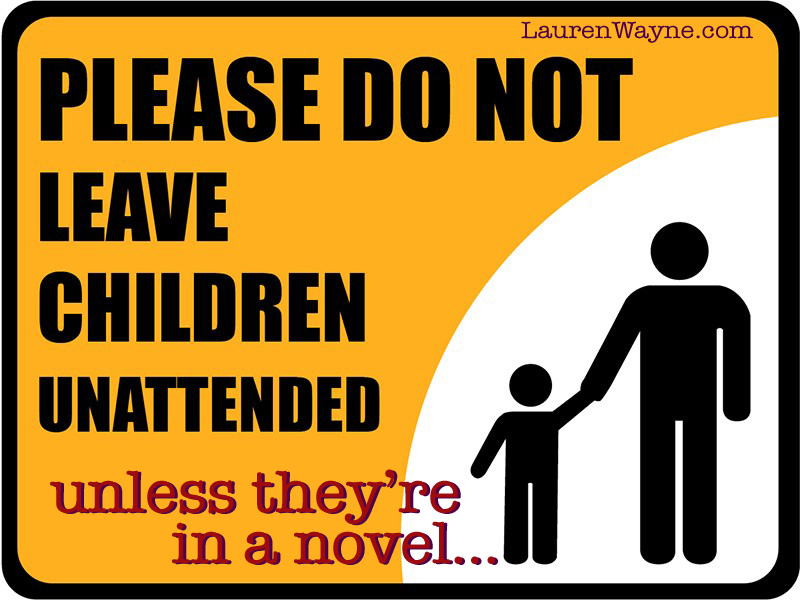
At the same time as I am reading Virals, a young adult novel by Kathy Reichs, I have happened upon this YouTube video from Feminist Frequency (thank you to Our Feminist Playschool for the direct) reviewing the book The Hunger Games:
The whole video's very interesting, as are Anita Sarkeesian's other works, but I just want to pull out one teensy tidbit that relates to the novel Virals as well as the whole oeuvre of children's literature.
Anita says that she finds it unbelievable that the parents in The Hunger Games wouldn't stand up and refuse to let their children be sacrificed.
Oh, yes. Totally. But that's viewing it as an adult and being all reasonable and stuff. Young adult and children's fiction depends on adults — and parents in particular — being ineffectual, powerless, cruel, or entirely absent.
5.07.2013
In celebration of a good novel: Kathy Reichs vs. Bones
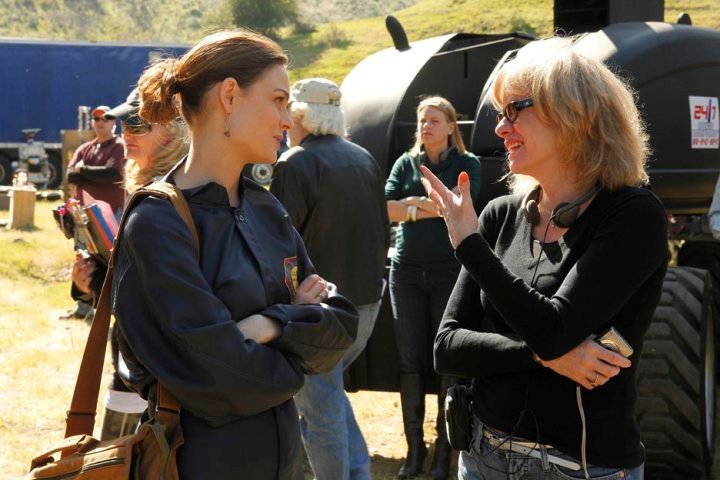 |
| Actor Emily Deschanel and author Kathy Reichs on the set of Bones (image courtesy Fox) |
I just checked out Bones Are Forever, by Kathy Reichs, from the library and realized it had been a long time since I felt that pull of a well-written novel. I found myself seeking out excuses to slip away to read, and I carried the book around with me in hopes odd respites would present themselves and need to be filled with a good book.
The TV show Bones, based on Reichs' work, is so goofily overwritten that it's astonishing it came out of the Temperance Brennan novels. I even like Bones, but it's so cringe-inducing for how two-dimensional the characters are and how painfully obvious each emotional revelation becomes.
It was refreshing to dive back into the original world of Tempe and enjoy Kathy Reichs' dry, exhaustively detailed, but fascinating peeks into the world of forensic anthropology — with some shootouts and kidnappings along for the thrills, of course.
Labels:
book reviews,
books,
kathy reichs,
mystery novels,
novels,
reading,
screenwriting,
TV
9.03.2012
Book review: The Help — Reassuring white people
Once again, I bring you: review for a book (and movie) no one's talking about anymore! Whee! Good thing I'm not a newspaper.
 The Help,
The Help,Let's unpack it a little. The Help is written by a white woman about black women. It's written by someone who was a girl in the 1960s about people who were adults during that time. It's written by someone in the middle/upper class about people in the working class. And not just about, but it's seeking to tell their stories — these people whose lives she is so far from experiencing.
And that gets a little meta, because Skeeter in the book is exactly the same thing: white, upper-middle class, young, telling the stories of maids.
I'm a writer of fiction. I don't at all believe you have to "write what you know" in some narrowly defined sense of not being able to write from a different person's point of view or tell a story set in a different time period. Where I think it crosses the line into potential racial offensiveness is when the perspective that's taken is one that has historically (and currently) been silenced and ignored. In other words, let me just say it outright: Where does a white lady get off thinking she can speak for black women?
Now, I'm writing this review from the point of view of being a white woman myself, so I poked around to see if any African-American women liked The Help. Funny enough: I found many eloquent voices decrying it. There's a clue right there.
I feel a little silly being another white woman talking about a white woman talking about black women, but I'll go with it. I'll say upfront that this review is addressed to my fellow white people, whether you're as clueless as I often am or not — though, naturally, I invite any people of color to read along and tell me what you think (about the book or my review) or point me to other resources, if you'd be so kind. And it's not meant to be condemning of white people, or to say that you shouldn't have liked The Help if you did. It's to talk about these issues, because I think too often as white people (blinded by privilege), we don't see the racist aspects of books like this.
So let's unpack this a little further. The characters in the book are types, not people. The black characters, particularly Aibileen, fit the mammy/magic Negro/noble savage stereotypes that have been offending people for years. I don't use those terms to suggest that I regularly use that language or enjoy doing so; that's kind of my point. They're offensive stereotypes, even though they're "good." This is a nonthreatening kind of black person, who exists to help white people accomplish what they want.
The white characters, with the exception of Skeeter, are mean bigots. On the surface, you'd think that having most of the white people be evil is not racist, in much the same way that you'd think having most of the black people be good is nonracist, but we just discussed why that's not so. Here's the problem with having the white people be bad-white-person stereotypes. We all look for someone to identify with in fiction, so it has to be someone. A white person reading the book thinks, "Wow, I'm not as mean as those other white people. That means I must be Skeeter." Then the next step is to assume that, if you lived in the 1960s, you would so totally be the type of white person who helps out black people.
But, statistically speaking, that's bologna. Because most white people in the 1960s were not in fact monsters and yet did not help out black people. So chances are, if you're white and were an adult in the 1960s, you would not have done anything to further the civil rights movement beyond, at most, cheering it on from a distance. In your head. But probably you wouldn't have gone even that far.
Labels:
book reviews,
books,
literary fiction,
novel writing,
novels,
reading,
writing
8.08.2012
Book review: Tempting Juliana, by Lauren Royal
Amazon Kindle's been yelling at me lately that I need to update my blog or get off the pot (not in those precise terms, perhaps). Herewith I bring you a very concise book review of a romance novel I pulled from the paperback shelves at the library.
(Our library has genre paperbacks that you can borrow without checking out. They just have stickers directing you to return them when done. Does your library have that? I think it's convenient but often wonder if the library's right to trust me on the honor system. As you see, time sometimes gets away from me.)
Where was I? Oh, yes, Tempting Juliana, by Lauren Royal. Always glad to review a fellow Lauren.
by Lauren Royal. Always glad to review a fellow Lauren.
This is not a new book, which is why it's hilariously available for anywhere from 1 cent up to $123.54.
up to $123.54.
Ok, the good: I thought it was generally well written, which is the first rule for my romance novel enjoyment. Well, duh, right? But I'm shocked at how many novels get published that are not well written, so it's not a given.
(Our library has genre paperbacks that you can borrow without checking out. They just have stickers directing you to return them when done. Does your library have that? I think it's convenient but often wonder if the library's right to trust me on the honor system. As you see, time sometimes gets away from me.)
Where was I? Oh, yes, Tempting Juliana,
This is not a new book, which is why it's hilariously available for anywhere from 1 cent
 |
| There's some seller chutzpah for you. |
Ok, the good: I thought it was generally well written, which is the first rule for my romance novel enjoyment. Well, duh, right? But I'm shocked at how many novels get published that are not well written, so it's not a given.
10.31.2011
Join us for NaNoProgMo: National Novel Progress Month!
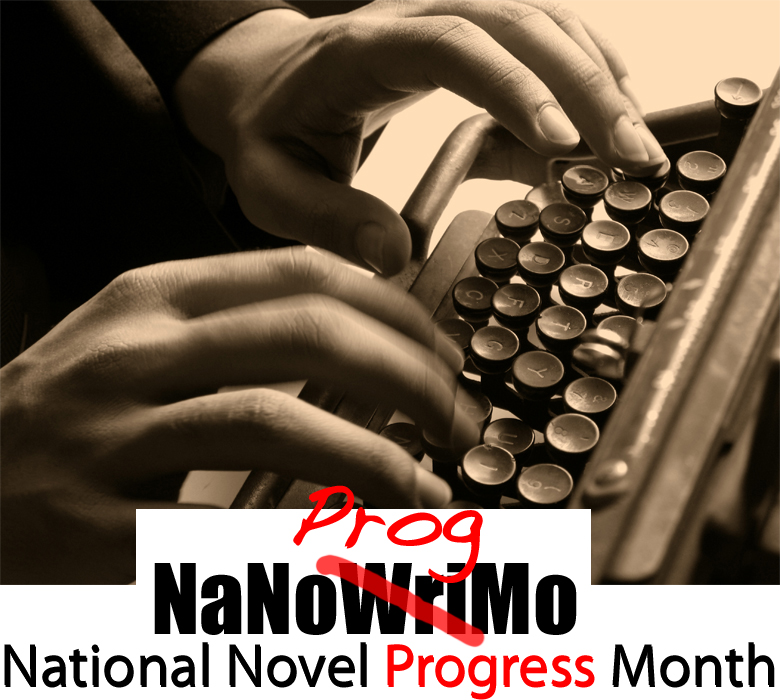
Introducing National Novel Progress Month, or NaNoProgMo in cool-people terms! This is a joint undertaking of encouragement and motivation by Teresa from Write On, Mom! / Mom Grooves and Lauren from LaurenWayne.com / Hobo Mama.
Maybe you're like us — inspired by National Novel Writing Month (NaNoWriMo) but unable or unwilling to participate this year in writing a novel from scratch in November.
We'd like to offer you some support as you work on your novel writing in November, in whatever form it takes!
Labels:
NaNoProgMo,
NaNoWriMo,
NaNoWriMo11,
novel writing,
novels,
writing
10.20.2011
National Novel Writing Month starts soon!
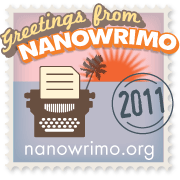 Who's doing NaNoWriMo this year?
Who's doing NaNoWriMo this year?If you want to join the nonsense of writing a whole novel (50,000 words) in November, you can start preparing now if you'd like by working on an outline and research. (No prose must be included in your November word count, but you can do a little work ahead if you're in the mood.)
Here's my news: After three years in a row of writing a novel in a month, I'm going to sit this November out.
I've officially written too many novels now — but have yet to finish the dang things!
So my November is going to be dedicated to my own private NaNoEdMo, National Novel Editing Month. If you want to join me, we could make it a bit more, um, national.
7.22.2010
The Secret Duke, by Jo Beverley
 I thought I'd throw up (blargh! just joking) a little review of The Secret Duke,
I thought I'd throw up (blargh! just joking) a little review of The Secret Duke,This book is part of the Malloren world, set in the Georgian period (mid-1700s, Malloren-wise). (Here's a full booklist at JoBev.com, and you can read an excerpt at her site as well.) I'm so used to Regencies that it's quite a treat to delve into a different era from time to time, and I love Jo Beverley, and I love the Mallorens.
So! To go a completely different direction, I'll discuss what I didn't so much like about this novel in particular.
But, first, I guess I should give a little intro and tell you what I did like. That's only fair, right?
Ok, the titular secret duke is the Duke of Ithorne, or Thorn, who likes to disguise himself occasionally and switch places with his illegitimate brother as Captain Rose and go on sailing adventures. The heroine is Bella Barstowe, who has escaped, due to a small inheritance, from under her pious brother's thumb after an unfortunate escapade (partially told in the prologue) that ruins her reputation. The characters were likable, and I enjoyed finding out what happens with Thorn. There was even a continuation of the Manx cat tale.
But:
This book contains the denouement of Lady Fowler, and I was a little disappointed (illogically) that there wasn't more to Lady Fowler than previously implied. She is in fact an ill-tempered, prudish woman. I thought maybe there'd be some sort of sly twist, and she'd turn out to be a cunning heiress who just liked messing with people by sending out gossip sheets disguised as calls for societal reform. But, no, she's just as she appears to be. This isn't Jo Beverley's fault, you understand. I'm apparently hard to please. Bella goes to work with Lady Fowler, believing her to be a true hope of reforming society and helping women escape from cruel men's dominance, before she discovers that Lady Fowler is in fact in the end stages of syphilis, losing all reason, and susceptible to the planting of treasonous seeds by newcomers.
The novel seemed a little oddly paced to me. Bella hates her priggish brother, Sir Augustus, and then finds out something scandalous about him that makes her plot to ruin him, with Captain Rose's help. There is a looong setup with this foul-Augustus angle, followed by a somewhat uncomfortable ending to that particular thread. But then there was still half the novel left to finish. The novel in general felt like several different stories pushed together: Bella on her initial escapade, Bella confined to her brother's house, Bella working with Lady Fowler, Bella's adventure with Captain Rose against Sir Augustus, etc.
The story demanded a lot of leaps of credulity in terms of the believability of disguises. Bella alters her beautiful appearance when she goes to work for Lady Fowler by applying a sallow base of makeup and donning spectacles (and moles or warts, I believe?). Bella also poses as Thorn's plain-ish wife, and as a nymph at a ball. But she's a gently bred young woman, not a cosmetics expert or super-spy. Thorn plays Captain Rose, even though the real Captain Rose actually exists and has to interact with the same people Thorn does in some instances. They're only half-brothers, too, not fully identical twins or anything. I kept thinking someone (besides Bella, in one scene where she meets the true captain) would notice something amiss in Thorn's portrayal, particularly the people who work with the captain on his ship.
As I scan the Amazon reviews,
Now, even with my issues with this book, I was still captivated by the story and love Beverley's writing and characters. I guess even with a great writer, not every book can be the best book.
So there you are! If you're a Malloren completist, you'll want to read this to hear Thorn's story and meet the enchanting Bella. If you're just being introduced to Jo Beverley, I'd pick a different book for your first meeting.
Labels:
book reviews,
books,
jo beverley,
novels,
reading,
reviews,
romance novels
7.05.2010
Bed of Roses by Nora Roberts and writing about professions
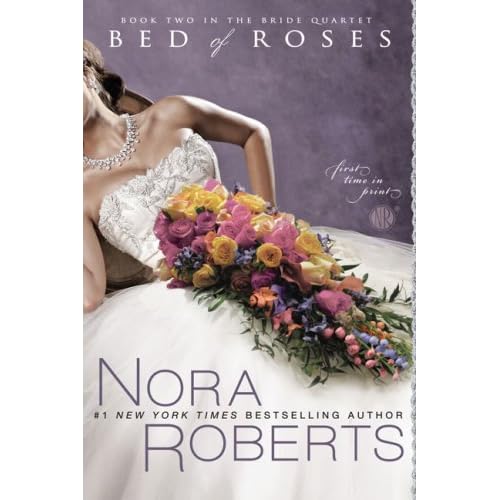 I'm taking Rachel from Common Places' advice and just getting my thoughts out. I apologize if this review sounds a little rushed — because it is. The book was due back at the library three days ago. Whoops.
I'm taking Rachel from Common Places' advice and just getting my thoughts out. I apologize if this review sounds a little rushed — because it is. The book was due back at the library three days ago. Whoops.Bed of Roses, by Nora Roberts,
This is one of those contemporary romance novels I was talking about that exists in a decadently upper-upper-upper-middle-class American fantasy setting. It's bearable, though, because (a) the characters all work, HARD, for a living and (b) the protagonist's mother was, improbably, a Mexican-nanny-turned-wife.
In fact, as I read any novel, I often like to pretend I'm the film director setting up how I would shoot the book as a screenplay. If I did for Bed of Roses, I'd start with the story of Emma's parents meeting after her father was widowed (instead of that boring sleepover that's supposed to set the scene of the four friends but just kept confusing me as to who was who and which one was going to be the protagonist — maybe I shouldn't have skipped Book One after all). The flashback in the film would be grainy, sepia-toned, and wordless with a dreamy narration, and the romance would be palpable. It would break from there to Emma's face, daydreaming about them — setting up her inability to settle for anything less than pure romance.
Just to sum up my reactions to the novel: I liked it, but I didn't fall head-over-heels with it. Nora Roberts knows how to write, and she's got a varied collection of interesting women in this Bride Quartet.
I find contemporary romances a little harder to swallow than historical, I think because the authors always try so hard to make the heroes manly-men. In historicals, I guess I sort of buy it and figure they might be more nuanced if they lived nowadays. But when people act all macho in a contemporary novel, I just think, "I wouldn't want to know that d-bag." Which is not to say the hero was obnoxious; it's just a general tone I get from most contemporaries, and I didn't feel like this one broke that alpha-male mold.
On the flip side, current contemporaries (contemporary contemporaries?) often try so hard to make sure the female protagonist meets the feminist checklist of being sure of herself, a driven career woman, sexually sophisticated, etc. Which is fine. But often it feels a little bland in itself, like it's compensating for something — like, if we make it really, really clear that the woman is obsessed with her work, then it will be OK she needs sentimentality on the side. Again, just a tad stereotypical. If the macho hero doesn't feel like the type of man I would (did) marry, then that type of heroine doesn't feel like the type of woman I am.
I thought the romantic-plot setup of man-who-can't-commit vs. woman-who-craves-romance was a little … meh. You know, done before.
I don't know. I guess what I'm saying is I didn't particularly connect with either character, but I didn't dislike them, either. They were fine. The book was fine.
But I do want to talk a little about Nora Roberts'
Whenever an author needs to do a heap of research for a profession, there's a chance of either of two things going wrong:
- cramming so many details in there that the readers get bored — it's a story, not a manual
- being so bare bones that readers don't get a true sense of what the profession is like, or getting an inaccurate (or stereotyped) sense
I think Roberts spins it just right in Bed of Roses.
There are little details that bring her world to life, like the fact her hands are always scratched from thorns and stems, despite working with something so seemingly delicate as flowers, and Roberts describes Emma using Neosporin
When the Vows ladies are discussing their business plans, Emma puts in a plug for an additional cooler — which I assume is some sort of cold storage to keep flowers from wilting. I don't even really care what it is exactly; I just appreciated hearing new vocabulary. It's like sitting in on a conversation with people from the circus. Isn't it fun to hear the nitty-gritty behind what from the outside seems like such a magical profession?
I think the choice of a wedding planning company was a master stroke, too, because there are so many ways to exploit that in terms of romance plot. But it's also a great way to bring interest to a novel through varied professions and a business in which women can be feminine while being savvy.
This is probably the shallowest part of this book review, but I thought the actual printing of the paperback was very nice. The size is a trade paperback, so larger than average, and the cover isn't glossy like most paperbacks but has that elegant muted sheen. What really stood out — at least as I was trying unsuccessfully to flip through the novel while writing this review — was that the edges of the pages are deckled. It's classy — the sort of detail a wedding planner, or a bride, might have chosen.
No, here's shallower: I was annoyed that it took so long into the novel before I could be sure Emma's hair was dark. Shouldn't that be upfront? I hate imagining characters wrong, or incompletely. I've read two books lately where hair color isn't confirmed till halfway through. And covers are no help in that regard, because (a) in both cases, the color is somewhat hard to see, and (b) I never trust cover artists to have read the book; I've been burned one too many times in the past. That was my overly dramatic way to say that covers often don't reflect the details of the characters' appearances as laid out in the text. Agreed?
What's the most interesting profession you've ever read or written about? What profession would you most like to research, assuming you would get to hang around the practitioners on the job? Come on, wouldn't the circus be awesome?
Labels:
book reviews,
books,
nora roberts,
novel writing,
novels,
romance novels,
tutorials,
writing,
writing tutorials
3.24.2010
Just keep writing, writing, writing
I'm with Dori on this one. The most important rule of writing, particularly something massive like a novel? You've gotta just keep going.
I've been remiss at keeping up with my novels of late, because I've been expending my creative energy blogging (and parenting). When I opened up my files to get back to work, I winced at how long it had been since the date of my last save.
Sometimes you need a little space to breathe between drafts, but here's the problem with taking too much time off:
You think about your novel, but you don't quite remember where you were. You know you had some ideas in mind for edits, but what were they again? You kick yourself for not making better notes, but at the time they were so fresh in your head, they didn't seem necessary. Now, though — ugh, to read through it all again, to try to remember what you wanted to remember. Such a chore, such a dragging waste of time.
Maybe you'll just put it off for another day or two...
Here's a kick in the pants for you, if you're anything like me and need one: Get your manuscript out. Start somewhere. Whether it's finishing or editing or writing the first page, start again. And then keep at it.
Repeat as necessary.
For more inspiration on the topic, check out Jerry Seinfeld's advice: Don't break the chain!
How many unfinished writing projects are you sitting on? What motivates you to get back to work? What motivates you to keep working, day by day?

I've been remiss at keeping up with my novels of late, because I've been expending my creative energy blogging (and parenting). When I opened up my files to get back to work, I winced at how long it had been since the date of my last save.
Sometimes you need a little space to breathe between drafts, but here's the problem with taking too much time off:
It's so, so, very hard to get started up again.
You think about your novel, but you don't quite remember where you were. You know you had some ideas in mind for edits, but what were they again? You kick yourself for not making better notes, but at the time they were so fresh in your head, they didn't seem necessary. Now, though — ugh, to read through it all again, to try to remember what you wanted to remember. Such a chore, such a dragging waste of time.
Maybe you'll just put it off for another day or two...
Here's a kick in the pants for you, if you're anything like me and need one: Get your manuscript out. Start somewhere. Whether it's finishing or editing or writing the first page, start again. And then keep at it.
Repeat as necessary.
For more inspiration on the topic, check out Jerry Seinfeld's advice: Don't break the chain!
How many unfinished writing projects are you sitting on? What motivates you to get back to work? What motivates you to keep working, day by day?

Labels:
mystery novels,
novel writing,
novels,
romance novels,
tutorials,
writing,
writing tutorials
12.02.2009
11.23.2009
NaNoWriMo write-in: Kids welcome

NaNoWriMo.org interviewed Ian Dudley, founder of the Kid-Friendly Write-In.
I've so far attended one write-in, in which I didn't introduce myself and wrote alone at a nearby table with my hot chocolate and brownie (woot! double fudginess!), because I'm like that.
But, whether I'm going to an organized write-in or just to a coffee shop for a write-in-of-one, I have to do something with...the kid.
Ian Dudley came up with the grand idea of welcoming kids to one of the South Bay, California, write-ins. It's a pioneering thing to do, but here's hoping it catches on and spreads to Seattle and the rest of the novel-writing nation!
Go to NaNoWriMo.org for the full interview, but here are some juicy excerpts:
When I became a dad this year, I realized how limited write-in options are for parents who can't find babysitters. We've heard about NaNo widows and widowers, but NaNo orphans aren't an option (unless you enjoy frequent visits from CPS).
There have definitely been some hazards. One boy is fully mobile and tall enough to grab things, such as my camera, off of tables. He also climbed onto his mom's vacant chair and merrily started 'adding' to her word count before she caught him. (I don't know if she kept the words.) Typing with your laptop on the floor is an even greater hazard, with outright key removal being a risk.
Another mom wrote 188 words at our last meeting, which doesn't sound like much until you consider that her daytime word count would otherwise be zero. She says this is the only write-in she can attend, and that alone makes it worth having.
Yea for parent-friendly, baby-friendly options! Before I became a parent, I thought that the US was a family-friendly country. And then I had my little one and found out just how excluded and universally mistrusted and outright disliked we are. So if you are childless (child-free/pre-child/post-child) and don't relish the idea of children in your coffee shop, please try to have a little compassion for the (literal) little guys. You were a child yourself once, unless you are a cyborg, in which case, 10001010010001001000. Because if you are a writer, someone inspired you to start writing. Maybe for these kids, it's their write-in-attending, NaNo-attempting parents.
Peace to all, great writers and small.
Photo courtesy Patricia Dekker on stock.xchng
Labels:
NaNoWriMo,
NaNoWriMo09,
novel writing,
novels,
write-ins,
writing
11.16.2009
NaNoWriMo elation deflation
 I was meaning to blog a few days ago about how upbeat I was feeling about NaNoWriMo. I really should have done it then, because now my balloon has popped.
I was meaning to blog a few days ago about how upbeat I was feeling about NaNoWriMo. I really should have done it then, because now my balloon has popped.I assume I'll get it back, so don't feel too bad. It's just that I took a hard look at the facts.
Fact #1: Despite being almost caught up to where I need to be to finish the month at 50,000 words, which is to say just over halfway there, I am nowhere near halfway done with my story. Furthermore, I looked at some statistics of average word lengths for romance novels, at least of the particular kind I am writing, and I got an average of 100,000-130,000 words. That's right. If I finish my 50,000 words, I will be at best halfway through my novel.
Fact #2: Hmm. I thought there was a Fact #2. My mistake.
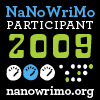 The NaNoWriMo rules state that you must have 50,000 words and a beginning, middle, and end. What this means is that I have a few options for finishing out NaNoWriMo and WINNING (if I could put sparkles around that word, I would, I swear):
The NaNoWriMo rules state that you must have 50,000 words and a beginning, middle, and end. What this means is that I have a few options for finishing out NaNoWriMo and WINNING (if I could put sparkles around that word, I would, I swear):Option #1: Finish up the story arc of my novel in 50,000 words by doing the writerly equivalent of skimming, at least as I get near the end date. Skip scenes, skip details, skip description, and just tell the bare-bones story.
Option #2: Write a whole heck of a lot more to finish the whole kit and caboodle by Nov. 30.
I have a 2-year-old and another blog and a home business and a life. I think Option #2 is off the table.
But this means that I will have to spend December and perhaps January (and if I'm really bad, let's pray not, February or more) writing the rest of the lost words to my novel.
Just to compare, last year I wrote a murder mystery, a jovial little thing that could clock in in final draft at 75,000 and be dandy. Once I'd done a first revision of my winning NaNoWriMo attempt, I had that easy. There were several scenes I needed to add, characters I had to flesh out, and descriptions to add in, because I hate descriptions (reading and writing! Sorry, all you describers of lovely sunsets!).
I compared my (other) unfinished romance novel to the NaNoWriMo length, and I am at 85,000 words in it, and I know I am about 2/3 to 3/4 of the way through my story there. See what I mean? Because I ain't never finished that 85,000-word one, so that's not a good track record, is it, now?
So I'm all intimidated and rightly humbled and all that.
But I soldier on. Keep writing.
Labels:
NaNoWriMo,
NaNoWriMo09,
novel writing,
novels,
romance novels,
writing
Subscribe to:
Posts (Atom)





